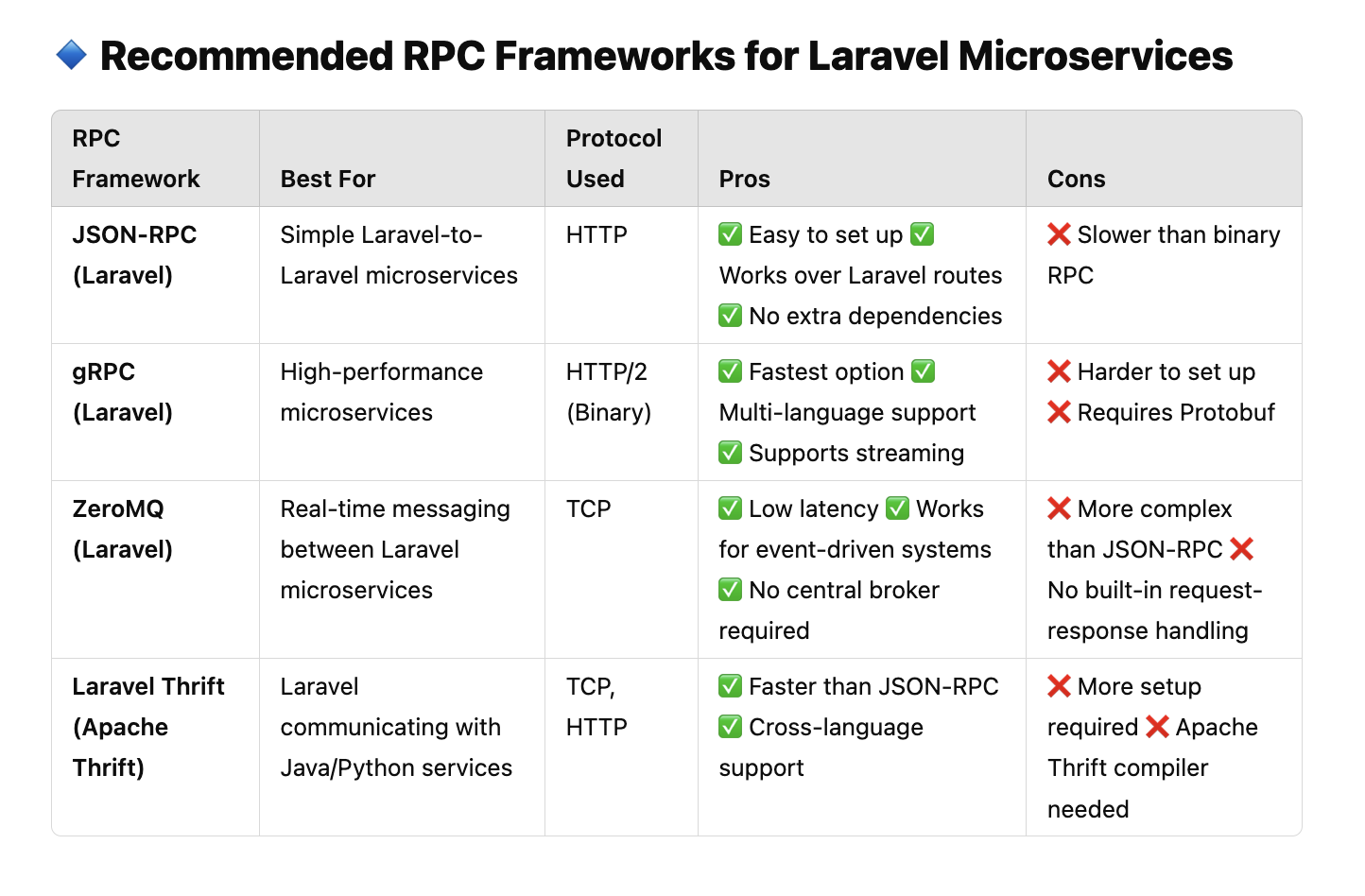🔹 Best RPC Framework for Laravel Microservices on XAMPP
Since you're using Laravel on XAMPP and running multiple microservices on the same server, the best RPC framework depends on performance, ease of integration, and future scalability.

🔹 Recommended RPC Frameworks for Laravel Microservices
| RPC Framework | Best For | Protocol Used | Pros | Cons |
|------------------|-------------|------------------|----------|----------|
| JSON-RPC (Laravel) | Simple Laravel-to-Laravel microservices | HTTP | ✅ Easy to set up ✅ Works over Laravel routes ✅ No extra dependencies | ❌ Slower than binary RPC |
| gRPC (Laravel) | High-performance microservices | HTTP/2 (Binary) | ✅ Fastest option ✅ Multi-language support ✅ Supports streaming | ❌ Harder to set up ❌ Requires Protobuf |
| ZeroMQ (Laravel) | Real-time messaging between Laravel microservices | TCP | ✅ Low latency ✅ Works for event-driven systems ✅ No central broker required | ❌ More complex than JSON-RPC ❌ No built-in request-response handling |
| Laravel Thrift (Apache Thrift) | Laravel communicating with Java/Python services | TCP, HTTP | ✅ Faster than JSON-RPC ✅ Cross-language support | ❌ More setup required ❌ Apache Thrift compiler needed |
🔹 How to Choose the Best RPC Framework for Laravel
Here’s how to choose the right RPC framework based on your use case:
✅ Use JSON-RPC (Laravel) → If You Want a Simple Setup
- Works over HTTP, easy to implement with Laravel routes.
- Ideal if your microservices are simple (e.g., authentication, payments, notifications).
- Best choice for Laravel-to-Laravel microservices in a basic setup.
✅ Use gRPC (Laravel) → If You Need High Performance
- If you expect high request rates and need fast response times, gRPC is best.
- Uses Protocol Buffers (binary format), 10x faster than JSON.
- Best for Laravel microservices interacting with Python, Go, or Java.
✅ Use ZeroMQ (Laravel) → If You Need Real-Time Communication
- If you need low-latency communication for real-time chat, notifications, stock trading, use ZeroMQ.
- Event-driven and messaging-based.
🔹 How to Implement RPC in Laravel (Examples)
1️⃣ Using JSON-RPC in Laravel (Easiest to Implement)
✅ Step 1: Install JSON-RPC Package in Laravel
composer require laravel-json-rpc/laravel
✅ Step 2: Create JSON-RPC Server in Laravel (routes/web.php)
use JsonRpcServer\Server;
Route::post('/rpc', function () {
$server = new Server([
'math' => new class {
public function add($a, $b) {
return $a + $b;
}
}
]);
return response($server->execute())->header('Content-Type', 'application/json');
});
✅ Step 3: Create JSON-RPC Client in Laravel
use JsonRpcClient\Client;
$client = new Client('http://localhost/rpc');
$result = $client->execute('math.add', [10, 5]);
echo "Result: " . $result; // Output: Result: 15
🔥 Why Choose JSON-RPC?
- Simple setup (No extra servers or dependencies)
- Works over Laravel’s existing routes (HTTP-based RPC).
2️⃣ Using gRPC in Laravel (For High Performance)
✅ Step 1: Install gRPC in Laravel
composer require grpc/grpc
✅ Step 2: Define the gRPC Service (calculator.proto)
syntax = "proto3";
service Calculator {
rpc Add (CalculationRequest) returns (CalculationResponse);
}
message CalculationRequest {
int32 num1 = 1;
int32 num2 = 2;
}
message CalculationResponse {
int32 result = 1;
}
✅ Step 3: Generate Laravel gRPC Code
protoc --proto_path=. --php_out=. --grpc_out=. calculator.proto
✅ Step 4: Create gRPC Client in Laravel
use Example\CalculatorClient;
use Example\CalculationRequest;
use Grpc\ChannelCredentials;
$client = new CalculatorClient('localhost:50051', [
'credentials' => ChannelCredentials::createInsecure()
]);
$request = new CalculationRequest();
$request->setNum1(10);
$request->setNum2(5);
$response = $client->Add($request)->wait();
echo $response[0]->getResult(); // Output: 15
🔥 Why Choose gRPC?
- 10x faster than JSON-RPC due to Protocol Buffers (Binary format).
- Best for scalable Laravel microservices with multi-language support.
3️⃣ Using ZeroMQ for Real-Time Laravel Microservices
✅ Step 1: Install ZeroMQ in Laravel
pecl install zmq
composer require ext-zmq
✅ Step 2: Create a ZeroMQ Server in Laravel (app/Console/Commands/ZmqServer.php)
use Illuminate\Console\Command;
use ZMQContext;
class ZmqServer extends Command {
protected $signature = 'zmq:server';
public function handle() {
$context = new ZMQContext();
$socket = $context->getSocket(ZMQ::SOCKET_REP);
$socket->bind("tcp://*:5555");
while (true) {
$message = $socket->recv();
echo "Received: $message\n";
$socket->send("Hello, $message");
}
}
}
✅ Step 3: Create a ZeroMQ Client in Laravel
use ZMQContext;
$context = new ZMQContext();
$socket = $context->getSocket(ZMQ::SOCKET_REQ);
$socket->connect("tcp://localhost:5555");
$socket->send("Alice");
$response = $socket->recv();
echo "Response: $response\n";
🔥 Why Choose ZeroMQ?
- Fastest communication between Laravel microservices.
- Ideal for event-driven systems like real-time notifications.
🔹 Final Recommendation
| Scenario | Best RPC Framework for Laravel Microservices |
|-------------|--------------------------------------------------|
| Simple, easy Laravel-to-Laravel communication | ✅ JSON-RPC |
| High-performance, multi-language microservices | ✅ gRPC |
| Real-time messaging & event-driven Laravel apps | ✅ ZeroMQ |
🎯 Final Thoughts
🚀 Best for Laravel beginners: JSON-RPC (Simple, works over Laravel routes).
🚀 Best for performance: gRPC (Binary format, fast).
🚀 Best for real-time messaging: ZeroMQ (Event-driven).
Would you like a detailed step-by-step tutorial on setting up JSON-RPC, gRPC, or ZeroMQ in Laravel? 😊